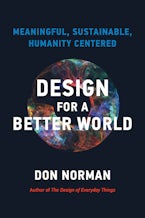

The world is a mess. Our dire predicament, from collapsing social structures to the climate crisis, has been millennia in the making and can be traced back to the erroneous belief that the earth's resources are infinite. The key to change, says Don Norman, is human behavior, covered in the book's three major themes: meaning, sustainability, and humanity-centeredness. Emphasize quality of life, not monetary rewards; restructure how we live to better protect the environment; and focus on all of humanity. Design for a Better World presents an eye-opening diagnosis of where we've gone wrong and a clear prescription for making things better.
Norman proposes a new way of thinking, one that recognizes our place in a complex global system where even simple behaviors affect the entire world. He identifies the economic metrics that contribute to the harmful effects of commerce and manufacturing and proposes a recalibration of what we consider important in life. His experience as both a scientist and business executive gives him the perspective to show how to make these changes while maintaining a thriving economy. Let the change begin with this book before it's too late.
Don Norman is Distinguished Professor Emeritus of Cognitive Science and Psychology and founding director of the Design Lab at the University of California, San Diego. Business Week has named Norman one of the world's most influential designers. He was an Apple Vice President, has been an advisor and board member for numerous companies, and has three honorary degrees. His numerous books have been translated into over 20 languages, including The Design of Everyday Things and Living with Complexity, also from the MIT Press.
“Norman's book shifts focus from the human to humanity, cracking the code on what values ought to be at the center when driving sustainable design. The message is loud and clear—the future of humanity is the future of the planet.”
Payal Arora, Professor and Chair, Technology, Values, and Global Media Cultures, Erasmus University; author of The Next Billion Users
“Don Norman joining the movement for responsible and sustainable design brings considerable heft to the demand for design to transform from a user-centric focus to serving society and the planet as a whole.”
Leyla Acaroglu, UN environmental program “Champion of the Earth” award; Founder and Sustainability Lead of Disrupt Design
“Through examples from science, technology, design, philosophy, and human behavior, Norman narrates the current global challenges and shows how design can play an essential role for making the world a better place. Yet another classic!”
Srini Srinivasan, Senator and former President, World Design Organization; Chief Operating Officer, Design Innovation Institute Shanghai
“Norman does it again with this essential book! His profound wisdom provides a mobilizing awareness for everyone. In this age of waste, unsustainability and total irresponsibility this book makes us rethink our ways of life.”
Anne Asensio, Vice-President Design, Dassault Systems; Board Member, World Design Organization; Member of the Circular Design leaders circle, Ellen MacArthur Foundation
"Norman (emer., Univ. of California, San Diego) offers a treatise on sustainable design, positing that too much of the world is designed rather than natural. According to Norman, people are surrounded by artifacts such as homes, clothes, tools, and books. This situation projects backward over millennia to hunting and farming existence. People born into this way of living have difficulty thinking of alternatives. Norman challenges readers to change their way of being, recognizing that people, nature, and the environment are a single complex system in which any change to a part might impact the whole. According to Norman's argument, designed things change the way people behave, act, and live: "we design the world, and it, in turn, designs us". He calls for a mobilization of the many to change the world into one in which success is measured not in money but in the wellness and happiness of all people. He believes the design profession must be rethought and move toward a circular economy centered on recycling through designing for repair, regeneration, and reuse. Summing Up: Recommended. Upper-division undergraduates. Graduate students and professionals."
Choice
"Don's Design for a Better World challenges the reader to critically examine the normative existing systems that inform and construct our everyday lives. Through pragmatic explorations, the book uncovers biases within calendar systems, scientific measurements and other constructions that constrain our existence for potential meaningful change. This book is an excellent introduction for those interested in human-centered design, design justice, systems design and the role of design in informing sustainable practices. Don's perspective is refreshing and optimistic, urging everyone to consider dismantling existing systems of power to bring about a 'better world.'"
The Association of Registered Graphic Designers